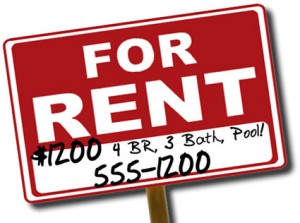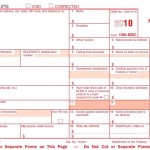UPDATE: Taxes are in a constant state of flux, and this is no exception. This requirement was repealed by by the signing of HR 4 (Comprehensive 1099 Taxpayer Protection and Repayment of Exchange Subsidy Overpayments Act of 2011 ) on April 14, 2011. You can read the text of HR 4 here.
Own a rental property or two? Rent out your vacation home?
Guess what. The paperwork you have to file with the Internal Revenue Service is going to grow quite a bit. This is thanks to a provision tucked into the Small Business Jobs Act of 2010 signed by President Obama a few months ago.
Let me explain.
Right now, only taxpayers whose real estate activities are considered – for tax purposes – to be a trade or business must issue 1099s. That excludes most of us who own rental properties. Our rental activities have always be treated as engaging in a “passive activity”– not a business. No 1099s required.
Just a side note: The reason for the passive activity treatment is that Congress doesn’t want us to be able to write off rental losses against salaries or other active business income. We can deduct a maximum of $25,000 in passive rental losses against non-passive income and the $25,000 deduction is phased out as a household’s modified adjusted gross income rises from $100,000 to $150,000. But I digress.
Any who, back to the 1099s.
The ne w provision subjects all of us who receive income from rental real estate to the same information-reporting requirements as taxpayers engaged in a trade or business. This means that you will need to issue a Form 1099 to any unincorporated service provider that you pay $600 or more in a calendar year. You will also need to furnish a copy to the IRS. This will apply to payments made after Dec. 31, 2010, and will cover, for example, payments made to plumbers, painters or accountants.
w provision subjects all of us who receive income from rental real estate to the same information-reporting requirements as taxpayers engaged in a trade or business. This means that you will need to issue a Form 1099 to any unincorporated service provider that you pay $600 or more in a calendar year. You will also need to furnish a copy to the IRS. This will apply to payments made after Dec. 31, 2010, and will cover, for example, payments made to plumbers, painters or accountants.
Now, you will not actually issue the required 1099s until early 2012, but you need to start keeping adequate records of payments starting Jan. 1, 2011, so you will be prepared to issue correct 1099s. Here are a few tips to help you get started:
Make sure you get a W-9 from every individual you pay. Do it before you hand over the first check, so you can ensure that you get the information needed for the 1099. This simple form asks for basic information such as the payee’s name, address, and tax ID number. You can get a copy HERE.
Verify the W-9 information before you file the 1099s.
Use your accounting software to track payments to your 1099 payees over the course of the year.
Don’t Have an EIN? Time to Get One. The Form 1099-K will allow you to provide either a business EIN (employer identification number) or your Social Security Number. Most landlords have not bothered to get an EIN. Why should we? Our rental income has been reported on our personal tax return, so we haven't needed that extra bit of hassle. Time to change that thinking! With ID theft rampant, it will really be in your best interests to apply for an EIN so that your Social Security Number will not be floating around on all of the 1099s you now have to issue.
Feel free to give me a shout if you have any questions about this or other tax issues.
Until next time, thanks for reading BillOnBusiness.net! Your comments and questions are welcomed below.